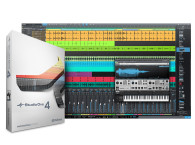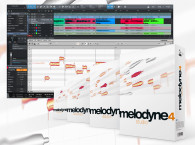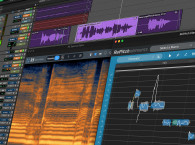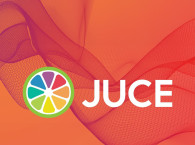
In almost ten years since its inception, the ARA Audio Random Access audio interface has developed into a real success story. Developed by Celemony in cooperation with Presonus Software (see image above of ARA integration in an earlier version of PreSonus’ Studio One software), it was conceived as a new standard to complement existing plug-in interfaces such as VST and Audio Unit. The objective was to make it possible for DAWs and plug-ins to exchange information of a musical nature, regarding such things as notes, chords and tempos.
The protocol was also intended, however, to afford access to the audio files used in the project, making the often tedious transfer procedures required by some plug-in architectures redundant. The closer integration achieved through ARA makes numerous new functions and workflow improvements possible that are especially useful when arranging or comping.
The seamless interaction between Melodyne and Studio One as well as the new workflows were enthusiastically received. Other manufacturers – on both the DAW and the plug-in side – were also soon supporting ARA, because ARA was designed from the start so that not only Melodyne but also other plug-ins could benefit from it.
ARA Audio Random Access offers a multitude of possibilities. Which of them are taken advantage of in any given implementation depends upon the technical context and the product strategy of the manufacturer concerned. ARA support is to be found in one form or another today in most of the leading DAWs, including Pro Tools, Logic Pro, Cubase, Studio One, Cakewalk, Nuendo, Samplitude, Sequoia, Mixcraft, Reaper, Sound Forge, Acid and Waveform. In addition to Melodyne itself, ARA support on the plug-in side is currently offered by Steinberg's SpectraLayers, as well as Antares, Izotope and Syncro Arts, with SoundRadix set to join them in the near future.
Right now, the fully revised and expanded ARA Audio Random Access Software Development Kit is available under the Apache 2.0 license, which also makes integration into projects with open-source licenses such as GNU GPLv3 possible. Interested developers can take advantage – free from licensing costs – of the full range of the ARA specification 2.0, which also covers more recent ARA features such as chord tracks, expanded copy & paste support, optimized routing and improved comping and editing.
The SDK allows seamless integration with popular development tools such as Git and Cmake. It includes detailed documentation of the interface as well as the entire integration process and extensive library code, plus numerous code examples and options for validating the ARA implementation. Celemony is accompanying this with an open-source example of ARA integration into the JUCE framework, currently one of the audio industry's leading development environments.

The ARA SDK on GitHub is available here.
Founded in 2000 by Peter Neubäcker, Hildegard Sourgens and Carsten Gehle, Celemony is a pioneering software developer in the musical, note-based editing of audio. The company's principal product, Melodyne, inaugurated this type of audio editing in 2001, established itself in the intervening years – for vocal editing in particular – as the standard worldwide, and has gone on pushing out the envelope in innovative audio editing ever since to the limits of what is technically possible. In 2008, Celemony presented its patented DNA Direct Note Access, which extended Melodyne's editing capabilities to polyphonic audio material – right down to individual notes within chords. Subsequent versions of Melodyne brought further technological innovations, including simultaneous note-based editing of an unlimited number of audio tracks, and the detection and separate editing of sibilants on vocal tracks. Other important technologies developed by Celemony include the musically intelligent restoration tool Capstan, able to detect and correct wow and flutter.
www.celemony.com







